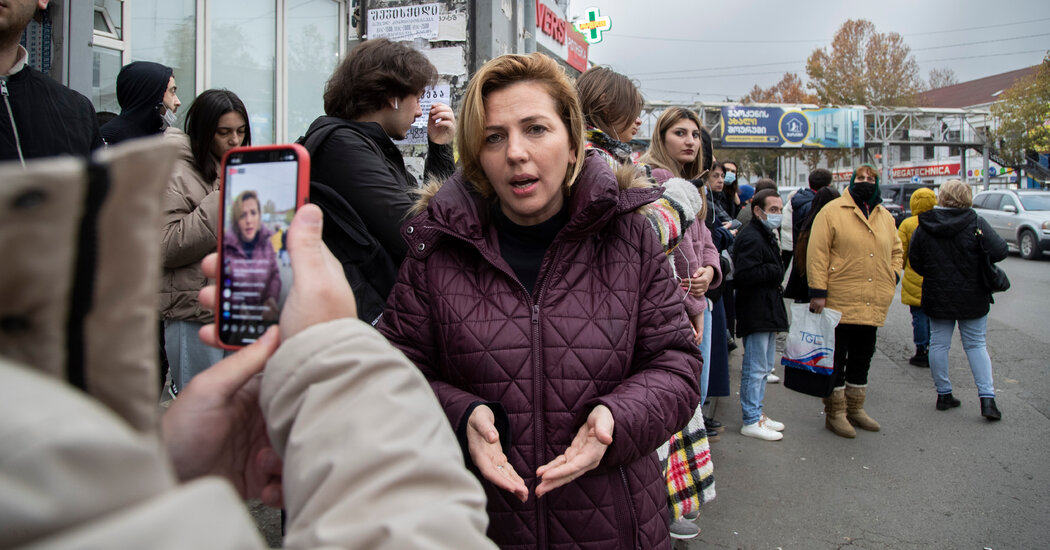This article is part of our Women and Leadership special report that profiles women leading the way on climate, politics and business around the globe.
When she arrived in Manchester, Vt., on an exchange program in the mid-1990s, Anna Dolidze, a high school student from the newly independent country of Georgia, was taken by her host family to a doughnut shop. She was stunned.
“First I had never seen doughnuts before,’’ said Ms. Dolidze, now 43. “And second, the choice was unbelievable, just unbelievable.”
In those post-Soviet years, Georgia was going through hard times. Electricity and hot water were only sporadically available in the capital city Tbilisi; the political situation was volatile, even dangerous. Ms. Dolidze considered herself lucky to be able to leave on a United States scholarship.
“That trip changed my life,’’ she said in a telephone interview from Tbilisi.
Over the last 18 months, Ms. Dolidze has emerged as a rising figure on Georgia’s political scene. In May 2021, she founded her own party, “For the People,’’ and in a national poll taken last month, she was named the country’s fourth most “favorably viewed figure” with a 40 percent rating, behind the revered 89-year-old Georgian Orthodox Patriarch, Ilia II — the longtime leader of the nation’s Orthodox church — who took first place, but ahead of the country’s first woman president, the French-born Salome Zourabichvili.
When Ms. Dolidze was a high school student in Vermont, friends teased her that she would be the first woman president of Georgia. But in 2018, that distinction was taken by Ms. Zourabichvili. Still, two years away from Georgia’s next national elections, Ms. Dolidze seems set to fulfill the political promise she showed as a teenager.
“Anna was a very unusual kid, very adult and obviously focused, ambitious,’’ said Helen Whyte, then a community activist in Vermont, who remains a friend. “She was always very interested in the future of her country.’’
Since then, Ms. Dolidze has racked up a roster of degrees: in law from Tbilisi State University; a masters in law from Leiden University in the Netherlands; and a Ph.D. from Cornell University. Later, she received a grant from N.Y.U., through a program for scholars facing threats to their well-being, which enabled her to teach law at Western University in Canada.
Along the way, Ms. Dolidze, who for a time served as chair of the Georgian Young Lawyers’ Association, has continued to campaign for the enforcement of the rule of law in Georgia. “I always had a will for change,’’ she said, ‘‘whether through politics, advocacy or law. I had a lot of grievances and anger inside.’’
She was openly critical of the human rights record of President Mikheil Saakashvili of Georgia and, after he left office in 2013, she returned to Georgia in 2015 to serve as a deputy defense minister.
Since then, she has served as the president’s parliamentary secretary and as a nonjudicial member of the High Council of Justice of Georgia, a role she quit under pressure after she first launched a political movement, which last year became a party. In the last parliamentary elections in 2020, she ran in a district of Tbilisi as an independent and won 17.9 percent of the vote.
Her dramatic jump in the November opinion poll came as a surprise even to her. “It is a huge token of recognition,’’ she said.
Some attribute Ms. Dolidze’s visibility to her active presence on social media, where she speaks out on issues that touch the lives of average citizens, whether that issue is minimum wage, public safety or the successive waves of Russians fleeing into Georgia to escape the repercussions from the ongoing war in Ukraine.
As the mother of a 15-year-old and a 19-month-old, she relates to the concerns of other Georgian parents. When a young girl was recently electrocuted in a city fountain because of faulty wiring, Ms. Dolidze added her voice to a citywide outcry, denouncing the corruption that allows for shoddy construction and calling for stricter controls.
Perhaps more pertinent, she is seen as a fresh face, someone who has not been involved in the decade-long feud between Georgian Dream, the ruling party founded by the oligarch Bidzina Ivanishvili, and United National Movement, the party loyal to Mr. Saakashvili, the former president, who was jailed on what his followers claim are political charges. In May, as his health deteriorated after a hunger strike, Mr. Saakashvili was transferred to a private clinic.
This rivalry is typical of the polarization that has divided Georgia since its independence from the Soviet Union in 1991. “Georgia does not have issue-based political parties,” said Thomas de Waal, an expert on Georgia and the Caucasus at Carnegie Europe, a think tank based in Brussels. “It has networks based on individuals who, when they come to power, erase all that was done in the past.’’
In this context, Ms. Dolidze appears as a potential “third force,” said Mr. de Waal. “She is a woman, she is young, and she is trying to make it not just about herself,’’ he explained. “She is not bashing her opponents, not talking in patriotic slogans but about real issues.”
Ms. Dolidze said she believes that the Georgian Dream government deliberately keeps a focus on Mr. Saakashvili and his health to divert attention from more pressing social and economic issues.
“We have paid a serious price for this dichotomy,’’ she said. “The focus on the animosity between the two groups and the two leaders has been working in favor of the government. It allows them to run the country on hatred, rather than their own performance indicators.’’
Ekaterine Diasamidze, a cultural anthropologist who lives in Tbilisi, said the result is a “a kind of nihilism, which is why we can’t move forward.’’
“People have the attitude that nothing is going to change, which is what is really killing progress,’’ she said.
The Russia-Ukraine war looms large over Georgian politics. Still traumatized by Russia’s invasion of their country in 2008, igniting a war that resulted in the loss of 20 percent of their territory, Georgians are virtually united in their distrust of their giant neighbor; in the November poll, 89 percent of respondents said Russia is Georgia’s biggest threat. And, in a 2022 poll by the National Democratic Institute, a large majority of respondents favored a path toward membership in the European Union.
In the last 10 months, more than 100,000 Russians who oppose the war in Ukraine, and want to avoid conscription, have settled in Georgia, a country of 3.7 million people. At least twice that many have passed through the country, benefiting from a generous visa policy that has been challenged by Ms. Dolidze. But her effort to impose some controls on who can come in, and how long they can stay, has gone nowhere, met by silence from a Georgian Dream government that has deliberately maintained an ambivalent stance on Russia. The government has voted against Russian aggression in the United Nations, but back home it has studiously avoided criticizing Moscow, even as tens of thousands of Georgians demonstrate in support of Ukraine.
Ms. Dolidze believes Georgian politics are on hold until the end of the war in Ukraine. “People are waiting to find space to express their own grievances — social, economic, rule of law and justice issues,’’ she said. “We are in the calm before the storm.’’


